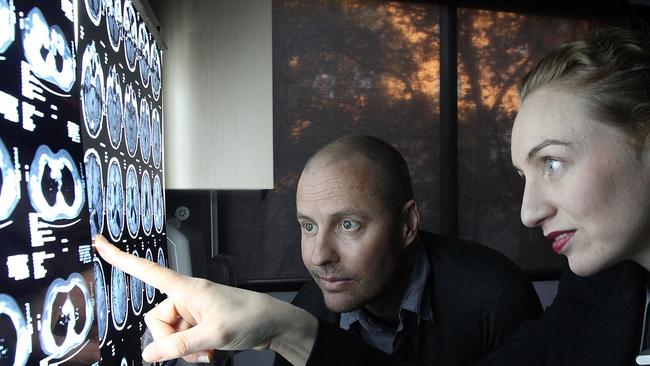New drug to be trialled on melanoma patients in world first
IN a world-first, a drug will be trialled on Victorian patients with melanoma so advanced it has spread to their brain.

VIC News
Don't miss out on the headlines from VIC News. Followed categories will be added to My News.
IN a world-first, a drug will be trialled on Victorian patients with melanoma so advanced it has spread to their brain.
The Melanoma Institute Australia hopes the immunotherapy drug — from the same class of treatments that helped businessman Ron Walker — will shrink tumours and extend patients’ lives.
One Australian dies every six hours from melanoma.
Patients with stage four melanoma are usually given less than six months to live and their poor prognosis excludes them from many trials.
The principal investigator, Associate Professor Georgina Long, of the MIA Poche Centre, said this was the first trial of immunotherapy treatment nivolumab on patients with melanoma in their brain.
“What happens to the immune system with cancer is that it becomes blind to the cancer cells — it can’t see it, so it can’t get rid of it,” Prof Long said.
Immunotherapy drugs help the immune system detect and attack the hidden cancer cells.
The trial began recruiting NSW patients late last year and is now inviting Victorians and Queenslanders to take part.
Victoria’s principal investigator, Professor Grant McArthur, of the Peter MacCallum Cancer Centre, said they were excited by the potential to help patients with brain metastases.
Prof McArthur said nivolumab hit the same target molecule, PD-1, as the drug Mr Walker received.
It was also sought by the late Save Locky’s Dad campaigner Nick Auden, who was ineligible for trials because his cancer had spread to his brain.
In this trial, patients will get nivolumab on its own or in combination with another melanoma drug, known as yervoy, or radiation therapy.
Jennifer Thulborn, 51, a former Victorian living in NSW, was told four years ago to “get her affairs in order”, but the mother of four has continued to defy the odds with surgery, radiation and new drugs.
“Getting access to this new drug on the trial means everything, it has given me hope. It may not be a cure, but it may prolong my life until there is one,” Mrs Thulborn said.
Up to $550,000 was raised to help fund the trial by last year’s annual Melanoma March.
This year, organisers need $1 million for a national research project to grow patients’ melanoma tumours in animal models. The tumours are then analysed to help clinicians tailor patients’ treatment


